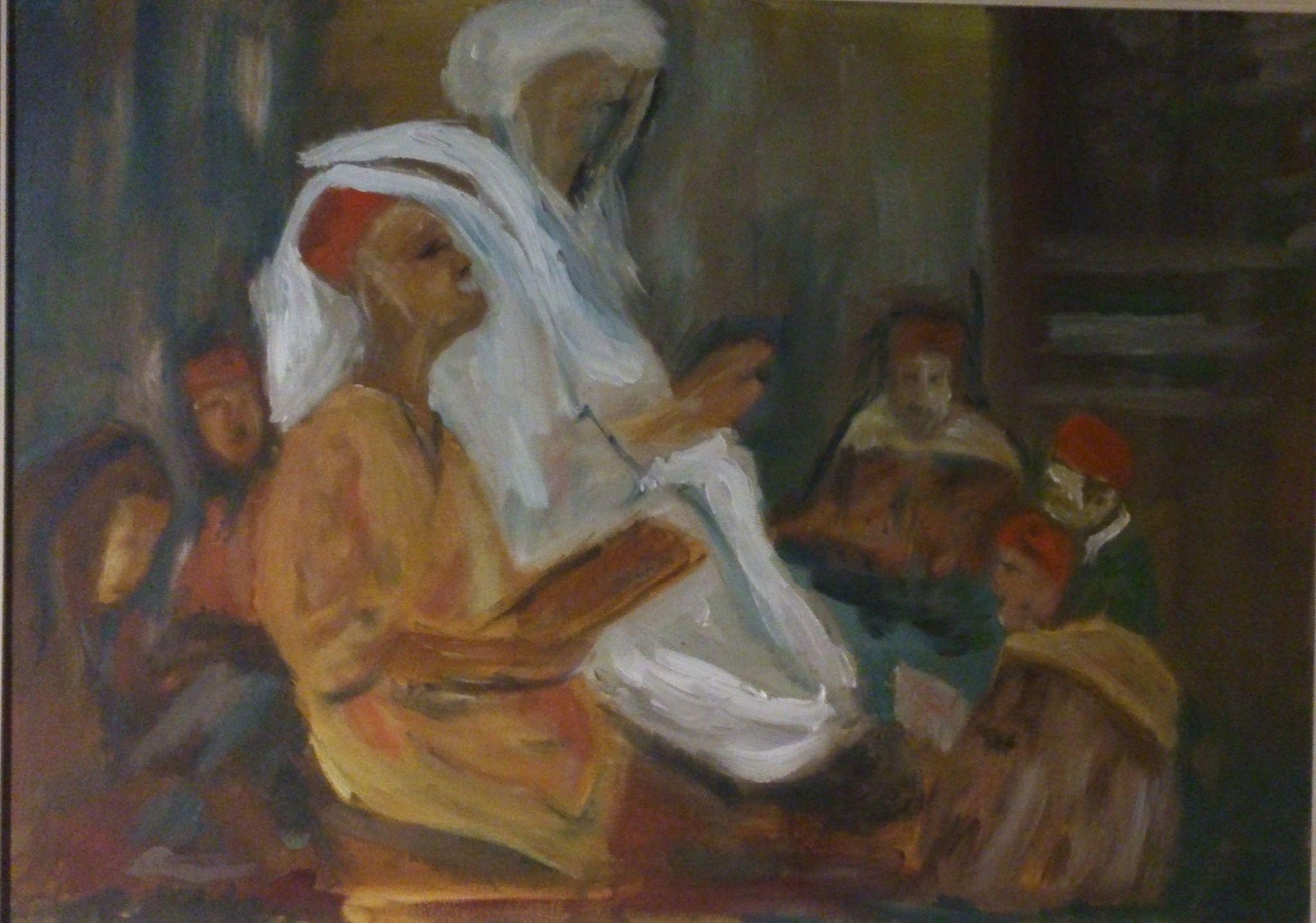Providence
In the general biblical concept, providence is God’s relationship to nature and the entire universe. It also relates to God’s work in history. That is, divine activity and human activity from human freedom to the authority of God who controls everything small and big.
Divine providence is God’s enduring and continuous work of maintaining His entire existence. All events in the universe throughout history are a set of divine plans and plans according to which the universe was created with all that it contains, including man.
Sephardic U
Is my presence on this website coincidental or is it an answer to my plea to God to find Jewish people with whom I have cultural, social, and ethnic kinship, meaning that they share the same roots and origins? And that is what has already been accomplished on this site. They are of Sephardic Andaluos and Maghreb origin and proud of their ancient origins, rich culture, and authentic and ancient customs. Even if you are not of that origin, the administrators of this site will make you feel like one of them, even if you come from a different background than them. Everyone is welcome on this divine side.
This site offers minyan group prayers. If the minyan number is available, starting with 10 or more people, and if the minyan number is not reached, then the prayer is as if it were a private prayer. Those who participate in prayer on this site are people who seek the face of God, despite the physical distance between them, from great distances, each in different countries and distant times from North and South America to Europe and others. But the spirit that unites them is one, for you are truly in the presence of God in the spirit. Prayers are read in Hebrew and the Bible is recited in Hebrew and sometimes in English and other languages.
My contact with this website was not accidental, but God’s providence and planning for me. I raised my voice to God, and pleaded Him glory be to Him, asking for His help and guidance as I walked the path of seeking wisdom and knowing the truth by finding people who were on the same path as I was. So I found myself in a world called “the virtual world” where people from different parts of the world sang and praised God morning and night.
This meeting encouraged me and strengthened my spirit to persevere and move closer to the desired goal of pursuing more Jewish religious knowledge, the law of the Holy Torah, and the Sephardic rituals of prayers and hymns.
Seeking God
“وتَطلُبونَني فتجِدونَني إذ تطلُبونَني بكُلِّ قَلبِكُمْ.”
“And you will seek and find me if you seek me with all your heart.”
And in the Catholic translation it came out like this:
“وتَملتَمِسونَني فتَجِدونَني، إِذا طَلَبتُموني بِكُلِّ قُلوبِكم”
“And you will seek me and you will find me if you seek me with all your hearts.”
In Hebrew it goes like this:
“וּבִקַּשְׁתֶּ֥ם אֹתִ֖י וּמְצָאתֶ֑ם כִּ֥י תִדְרְשֻׁ֖נִי בְּכָל־לְבַבְכֶֽם׃”
You will search for Me and find Me, if only you seek Me wholeheartedly.
The speech here is addressed to a nation as individuals and as a group with different hearts and at the same time all these hearts have one goal as if it were one heart and not hearts. God seeks the complete, one, undivided heart, and how can the single heart be divided into parts? This happens when we have multiple goals in mind for our future life. An old man living in a village would always repeat to his friends and family when he died his wish to be buried under a tree with green branches. One day one of his grandchildren asked him: “Why do you want to be buried under this tree?” The old grandpa answered his grandson to protect me from the heat of the sun with their shades. What a wish!!
The Greats
Rambam exemplifies the religion of human perfection, the religion of intellectual and philosophical contemplation of the Creator. He depicts his idea with the planes of the human spirit, with groups of people standing around the royal palace, some outside the city walls, and following no religion. Their purpose in life, as Johann Wolfgang von Goethe said: “You don‘t travel to arrive, but to travel.” In this case, the journey is the destination and the goal.
Then Rabi Musa bin Maimon adds that among these people are those who actually entered the king‘s city. These people think they belong to a religion, but they are mistaken in thinking about it.
Some of these people try to enter the Royal Palace but cannot because they do not know how to get there, and these are the ones who know the Divine law in a superficial and naive way.
The third group are those who arrived at the palace and wandered around it, contemplating its external beauty and not delving into intellectual and philosophical considerations. As for the interior of the palace, there are religions that are deeply concerned with thinking and contemplating the principles of religion. They live near the king.
Christian Thought
My older brother once said to me when I was explaining to him the doctrine of the Christian religion from the point of view of Protestant thought, so he replied to me, “Why do you preoccupy yourself with all these things? What is the use of digging the past? Look at the future. It does not matter how our ancestors lived,
Each one has to accept his current reality, the Muslim remains as Muslim, the Christian follows his Christianity, and the Jew continues his Judaism. I told him you mean that if you find people who worship a donkey, you have to provide them with hay? Is that what you mean? he kept going and saying, “Live your life now. Leave this nonsense.” and went on.
As for me, I allowed my thoughts to wander and said to myself, “If a beggar came to you, would you turn him away and give him nothing of what you have? Or would you share with him what God has given you?”
Muslim Thought
Yes, when I was a Muslim, I did not need to ask anyone outside my faith. At that time, I felt that I was satisfied with my religious faith, which was Islam, and I did not demand any other faith than my religion and faith. But by chance I got to know some missionaries, foreigners, and citizens. They gave me a false picture about Christianity and Judaism, which is contrary to what Christians and Jews alike believe. This gap in my Islamic belief made me turn away from Islam. And since Christianity was the one that confronted me, I accepted it and did not discuss it, so I believed the Gospel narrative without researching it, and I did not understand its basic doctrines, such as the idea of the Trinity for example, until the Islamic thinker Abu Hamid Al-Ghazali made it easier for me. He said, “How can the limited mind comprehend the unlimited?” This phrase was the key to accepting the idea of God’s appearance in flesh.
The issue of the Holy Spirit remained, so I accepted it without reaching a solution. I ignored it, as it is the case with Muslims, because it is not given to man to understand the meaning of the soul, for man is given a little knowledge. This is how I lived my life, but my mind did not find rest in it (Christianity). It became as if my clothes had been removed from me, so I remained naked. Questions began to arise in me, especially in some theological issues and keeping the commandments that God gave us in His Torah, the issue of the Old and New Testaments. It is like God sending us from time to time a new update of religion based on Judaism.
The Truth Revealed
Then I began reading the Bible and comparing it with different translations. I also discovered my background and my roots that go back to Judaism, which made me accept the doctrine of “Replacement Theology.” I remained clinging to this idea that Judaism was replaced by Christianity and Judaism no longer played a role, as Judaism ended its work and was no longer useful. Then came the year 2000, and I attended a messianic conference in Jerusalem. There, the flame ignited in my heart, and I began seriously to study Judaism and research into the religious background of my family. Thus, I began to read the Bible in the light of the Jewish understanding of Christian issues and what they say about them. The fog that was hovering around me began to clear and dissipate little by little, as if a strong light shone around me to illuminate my path and guide me.
I pleaded with God to guide me to a Jewish community of Sephardic and Maghreb origins, even through the virtual world of the Internet. Thus, the wish was fulfilled when I got to know one of the rabbis at the beginning through the Internet. He was a convert from Christianity to Judaism, and his journey between religions was similar to my case. Then I got to know him personally, and he was a great helper to me. After that, I got to know the Sephardic U site, and this site was, to the extent of the hour, my practical assistant in presenting all that I lacked in terms of information and practical matters, despite the distance, in a very practical way. I am grateful for this site and thank all those who are working hard to develop and improve it, provide historical, cultural, and artistic information, and simplify religious teachings. May Hashem’s blessing be upon each and every one of the members of this virtual site.









Ohr HaChaim Yomi – Shemini